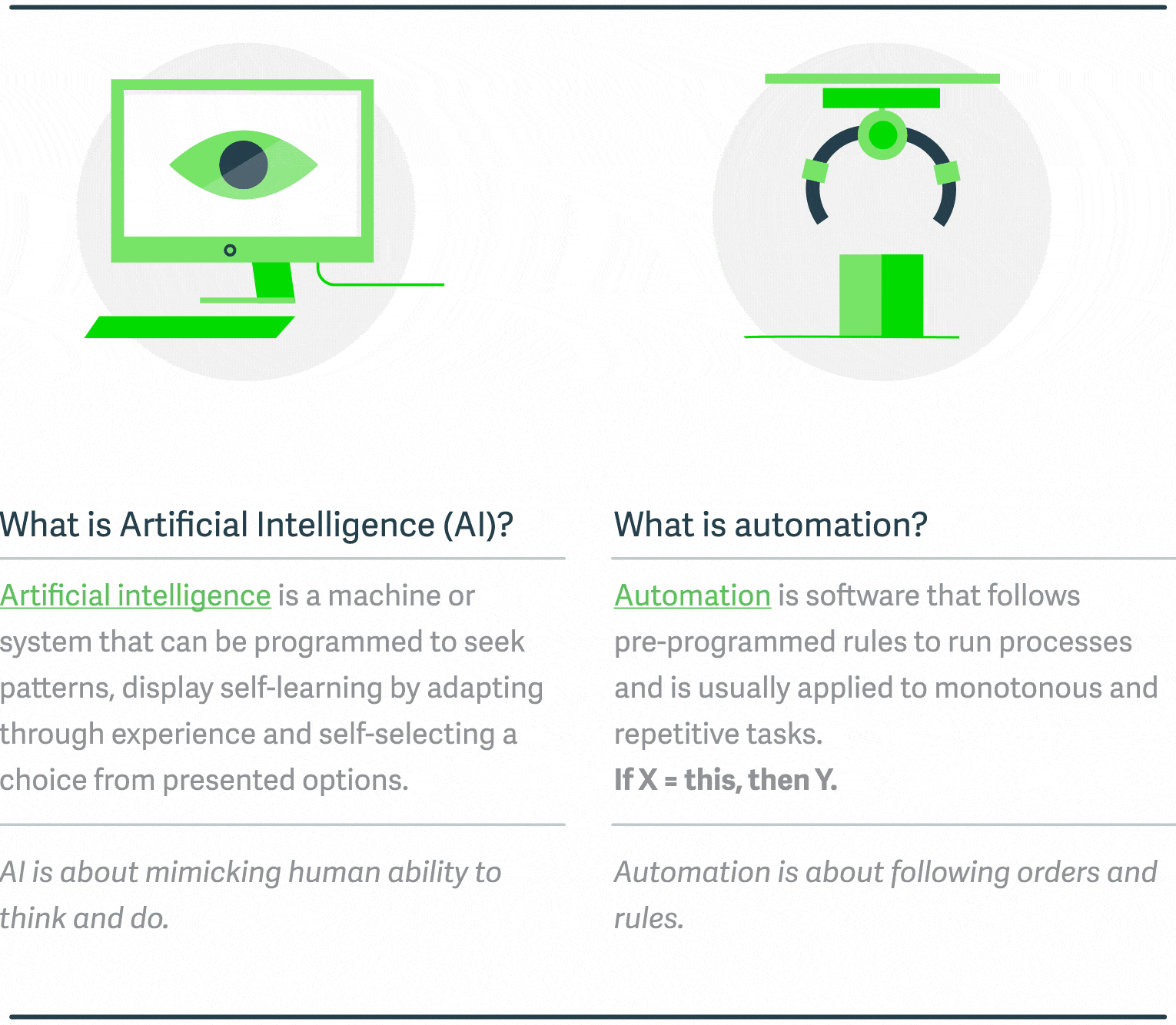You may have heard speculation that the 'robot' revolution is fast approaching. And whilst we're not living in some Matrix-style dystopian future, it’s actually already here. Artificial intelligence has existed for nearly 60 years but has only recently become more mainstream and integrated into many of our industries. And with the ever-growing importance of data and analysis in making informed business decisions, the role of artificial intelligence and automation will play an even greater role in modern business.
Let’s take a look at the background of AI and automation technology, the benefits of incorporating them into your small business, and how you can adopt AI applications into your everyday business practices.
What is AI and automation?
Before exploring the benefits, it’s important to understand the difference between AI and automation. The line between the two is often blurred, as these two technologies frequently work hand-in-hand with AI underlying automation. However, it would be wrong to assume that they're the same thing.

The benefits of AI and automation
The use of AI and automation technology has different benefits depending on the industry it’s being used in, but their flexibility and adaptability mean that almost any industry can benefit from incorporating them.
For example, within the healthcare industry, AI technology can more effectively diagnose skin cancer, and speed up the treatment process and recovery time, while in education it can analyze students’ learning behaviours, enabling teaching staff to effectively gain a greater understanding of the needs of their students, and collaborate to maximize the students learning. It also allows them create bespoke teaching approaches for students with disabilities, ensuring they are not left behind.
Across many other industries, manufacturing and engineering in particular, these new technologies can increase productivity amongst the workforce, cut down on human error, and improve safety and innovation while simultaneously decreasing costs. And while many are understandably worried about automation and AI taking their jobs, many employers will choose instead to re-skill their existing workforce and shift their priorities.
How SMEs can integrate AI and automation
With so many benefits, you’re probably now thinking about how your company can integrate AI and automation technology. Here are some of the applications that are currently available and an insight into how they can help you run a more efficient business.
1. Automated email
As any small business owner knows, emails can take up a considerable amount of your day. Yet, it’s important to promptly and professionally answer emails as it could lead to a big opportunity for your company. Automated emails help streamline the process. Gmail will remind you to follow-up on emails sent a few days ago while MailChimp will allow you to analyse engagement rates with email marketing campaigns.
With any small business, it's also imperative that any money spent on marketing is working as hard as it can, and giving you the maximum return on your investment. Using automated email programs, you can efficiently and cost-effectively re-target previous customers, up-sell customers currently in the buying cycle, and on-board new customers in a more effective way.
2. Job applications
The recruitment process can be lengthy and time consuming and often quite frustrating for business owners looking to make the right recruitment decisions, first time.
Intelligent systems like SmartRecruiters and Zoho make it easier by sorting and filtering applications based on criteria such as experience and skill set. Essentially, these programs streamline the recruitment process so that you have more time to focus on interviewing candidates and finding the best person for your company.
From the perspective of the recruiter, artificial intelligence and automation is also changing how they work for the better. By automating repetitive, small tasks such as emailing and candidate outreach, recruiters are able to spend more time on placing candidates in the ideal positions, benefiting all parties involved.
3. Invoicing and Online Accounting
Balancing the books can be quite mundane and can take up quite a lot of valuable time or money, especially if, like many small business owners, you don't have the resources to have a dedicated, in-house, accounts team.
Cloud-based software can send automated invoices so you won’t need to manually create or track invoices. Many accounting platforms will also automatically chase up unpaid invoices, allowing you to get on with running your business and cutting down the ever-present problem of late payment. When payments are received, software can match it up to the invoice and note it within your accounting records, via integrations with your bank account.
Artificial intelligence and automation are technologies that are constantly adapting and evolving, and so these are only some of the products currently available for businesses. Because of this, it’s worth keeping an eye on the market as new applications are constantly being released. You can find out more about AI and how it can help your business with Sage’s guide to AI and automation: the benefits for business and industry.
About the Author
Stacey McIntosh is the editor-in-chief of Sage Advice UK. He has more than 15 years of editorial, PR and social media experience and has worked across print and online for national newspapers, magazines, PR and marketing agencies including Metro, GQ, Men’s Fitness, International Business Times UK and Cool Blue.






These cookies are set by a range of social media services that we have added to the site to enable you to share our content with your friends and networks. They are capable of tracking your browser across other sites and building up a profile of your interests. This may impact the content and messages you see on other websites you visit.
If you do not allow these cookies you may not be able to use or see these sharing tools.